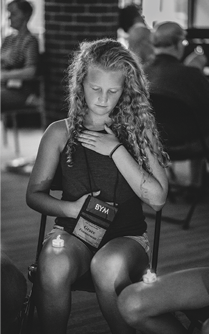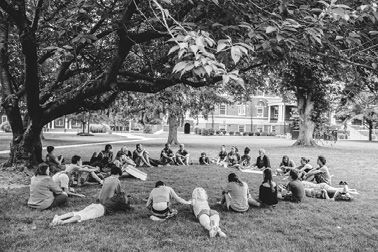Miles White Beneficial Society Interchange Articles
The text of recent Miles White Beneficial Society reports in the Interchange are are below, with the most recent at the top and older reports below. To jump to a particular report, simply click the item listed below.
Winter 2025 Interchange Spring 2020 Interchange Fall 2016 Interchange |
| |
|
Spring 2020 Interchange Report
Miles White Work and Legacy Continue
Kathryn Pettus, President of Miles White Beneficial Society of Baltimore City Corporation
Before we were fully aware of the virulence of the COVID-19 virus and the response of world markets to its devastation, members of the Board of Trustees of the Miles White Beneficial Society sat around our meeting table and reflected on guidance for awarding scholarships and grants in 2020. Traditionally, the amount of money available for awards is linked to investment returns. When the economy is performing well, funds are more readily available for scholarships for college students and grants to charities, educational organizations, and special projects for children. When the economy is performing poorly, unfortunately, the reaction is often one of retreating from giving.
During our meeting, one convincing note of guidance caught our attention. It stated that the irony of retreating from giving during periods when the economy is performing poorly is that these periods are the same ones during which the most people are in need and when the organizations that serve them are most dependent on support. Although financial markets were performing well at the time of our meeting, the sentiment and tone of this statement was impactful and will continue to influence and shape our commitment to giving for years that follow.
In a few short weeks, the reality of our global health crises was apparent. There were days when financial markets tumbled. Fortunately, the Miles White Board had already developed its schedule of work for the year, and each of its three giving cycles had been established. The Education Committee had launched its work and established electronic connections to distribute and receive materials. In addition, virtual platforms have allowed committee members to meet, discuss and consider next steps. The work of the corporation continues.
The Board expects to continue its work on schedule. Scholarships will be available to undergraduates in the fall and grants to educational organizations will be available for ongoing work. The Special Projects Committee will begin its work to support summer activities for children and youths in the Greater Baltimore Area. While we do not yet know what forms these activities might take, we do know that the need is great, and we remain confident that the creative spirit of humankind will rise to meet it. In July, the third cycle of support begins as the Charities Committee will receive applications from non-profits that provide programs and services that are essential to the health and wellbeing of clients.
The year 2020 will be recorded as an astounding time in our lives. How we respond to events provide a measure of who we are and what we stand for as individuals and as organizations. The Miles White Beneficial Society stands ready to continue its support of programs and opportunities for children, youths, and young adults; and it also stands ready to support programs that serve women, men and families. We are grateful that we can continue the work of the Society because to persevere is a fundamental part of our legacy. In extraordinary times, the work of service continues. In extraordinary times, support of activities for the greater good of society must be heightened not lessened.
Fall 2016 Interchange Report: Miles White Beneficial Society Supports Children in Baltimore City

Annual Session 2016 photo by Jennifer Domenick
Mary Ellen Saterlie is the President of the Miles White Beneficial Society.
Submitted by Kathryn Pettus.
In response to recent turmoil in the city of Baltimore following the death of Freddie Gray, board members of the Miles White Beneficial Society, a benevolent corporation, sought to find ways to make a difference in the lives of residents in neighborhoods that were beginning the long processes of rebuilding and renewal. How could a small charitable corporation contribute in a significant and meaningful way to these processes? The board, guided by the original purposes for which the Society was created, agreed to focus on contributing to the future well-being of the city of Baltimore by supporting summer programs for children in neighborhoods that bore the scars of the social and political unrest.
The Miles White Beneficial Society identified four organizations that were at work in Baltimore neighborhoods and extended invitations for proposals for funding that would specifically address needs and interests of children during the summer months. Quick responses from the organizations enabled the Society to award grants to the following programs:
Friend of a Friend, sponsored by The American Friends Service Committee, to support the Urban Gardening Program in Gilmore Homes.
Summer Camp, sponsored by the McKim Community Association, to create a Community of Care for children in the Jonestown neighborhood.
Out-of-School Summer Youth Program, sponsored by Unified Efforts and Fusion Partnerships, to provide academic and cultural enrichment activities for children in the Penn North and Sandstone neighborhoods.
Quaker Camp at Opequon, sponsored by Baltimore SRIDE (Supporting Transformative Relationships in Diverse Environments) of the Baltimore Yearly Meeting of the Religious Society of Friends, to provide camping experiences for children of diverse backgrounds.

Annual Session 2016 photo by Jennifer Domenick
The four neighborhoods that benefitted from the grants – Gilmore Homes, Jonestown, Penn North, and Sandstone – are among the areas that were most deeply affected by the results of recent disquiet in Baltimore.
Miles White, a Baltimore Friend, founded the Beneficial Society in 1874 for educational, charitable, and beneficial purposes to serve young and needy citizens in the city of Baltimore. White had for many years been a benefactor of humanitarian causes, but two years before his death he established the legal entity that became the Miles White Beneficial Society of Baltimore City and provided a generous endowment for its work. For 137 years, the Society continued its work as a self-perpetuating organization, awarding grants to educational institutions and charities and awarding scholarships for undergraduate studies. In 2011, the Beneficial Society became a supporting organization under the auspices of the Baltimore Yearly Meeting of the Religious Society of Friends. Now 142 years after its founding, the Society continues to be inspired by the legacy of its founder Miles White and works diligently to fulfill his vision of service and support to people and communities.

